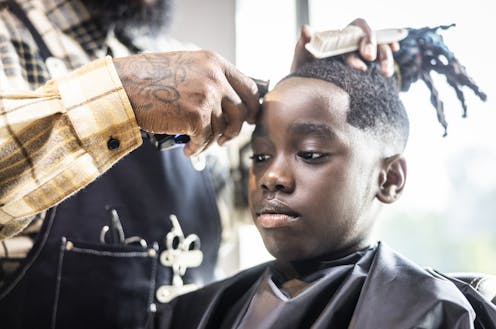A Texas court ruling on a Black student wearing hair in long locs reflects history of racism in scho
A scholar on racism weighs in on a recent court decision that upheld a school’s decision to punish a Black male student for wearing his hair in long locs.

A Texas judge ruled on Feb. 22, 2024, that the Barbers Hill School District didn’t violate the law when it punished Darryl George, a Black student, for wearing his hair in long locs. The Texas law in question – the CROWN Act – prohibits discrimination against hairstyles in schools and workplaces. The school district argued – and Judge Chap B. Cain III agreed – that the law doesn’t mention anything about hair length. In the following Q&A, Kenjus Watson, an education professor at American University who studies the psychological and social effects of racism, discusses how the decision upholds a long-standing legacy of cultural assimilation .
What message has the court just sent?
I’d argue it’s a harsh reminder that the natural appearance, cultural expressions and freedom of Black children are incompatible with the objectives and ideals of the school system in the U.S. Those objectives and ideals were created to establish social order, enforce conformity, demand cultural assimilation and suppress marginalized groups.
The court decision in Texas – and the no-long-hair policy in the Barbers Hill Independent School District – might seem outdated, misinformed or at odds with best practices for culturally responsive education. But as I and other researchers have found, strict monitoring and other anti-Black practices – such as those regarding Black children’s hair, bodies, language, clothing and even their presence – are widespread in America’s schools.
What options do Black students have?
Since education is compulsory for minors, the only options for Black families are to find schools that attempt to prioritize their overall well-being by being supportive of their children’s hairstyle and other cultural values, or to educate their children at home, as many Black families do now.
Finding a culturally supportive school can be a challenge. Despite efforts from Black families, educators, leaders and allies to create more inclusive environments in schools, anti-Black racism is pervasive in educational settings – from pre-K through higher education.
Staying in a school system that is hostile to Black cultural expression can threaten children’s well-being. Extensive research has found that racial microaggressions – everyday acts of racism – can adversely affect the mental and physical health of Black people.
My own research has found that it can affect the biological health of Black young people. The hormones the body releases under stressful racial events can damage the DNA of Black students. Over time, this can contribute to higher rates of disease and overall shorter life expectancy among Black people in the U.S. Finding a supportive school can be an even more urgent matter of life and death. Researchers have found that enduring everyday racism in school is also a key factor behind rising suicide rates for Black youth.
What should school leaders consider?
If educational leaders want to see Black students flourish, I believe they should dismantle racist policies that require order, conformity and assimilation. They should replace these with schoolwide microaffirmative practices that validate Black student cultural expressions, identities, resilience and brilliance. They can also prioritize mental and emotional health and wellness.
To move toward a new educational system that truly serves all students, I argue that it is crucial to listen to Black families and students in the development of school policies, curriculum and instruction. Doing so can help place Black families’ current experiences within the broader context of the ongoing struggle against discrimination and unjust legal decisions, such as the one against Darryl George.
Kenjus T. Watson does not work for, consult, own shares in or receive funding from any company or organization that would benefit from this article, and has disclosed no relevant affiliations beyond their academic appointment.
Read These Next
The greatest risk of AI in higher education isn’t cheating – it’s the erosion of learning itself
Automating knowledge production and teaching weakens the ecosystem of students and scholars that sustains…
‘Learning to be humble meant taming my need to stand out from the group’ – a humility scholar explai
Humility is a virtue that many people admire but far fewer practice. A scholar describes how a professional…
Russia tested NATO’s airspace 18 times in 2025 alone – a 200% surge that signals a dangerous shift
With each year of the Ukraine-Russia war, Moscow has upped its violations of neighboring states’ airspace…






